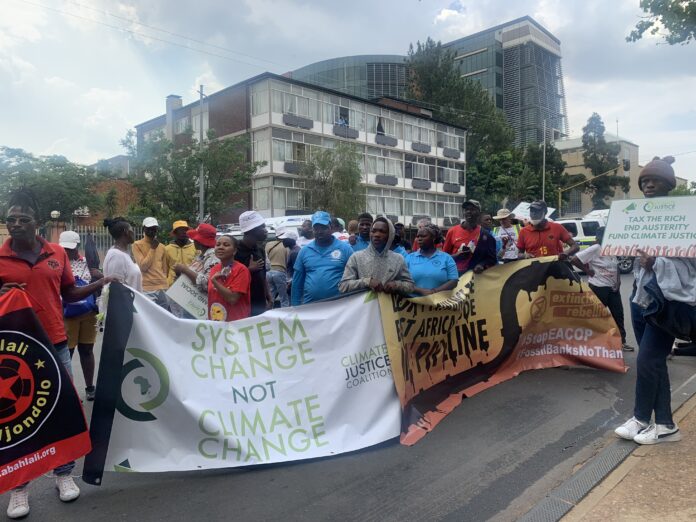South Africa can only meet its commitments to reach net zero emissions with help from local and transnational financing, from both the public and private sectors
COP27 concluded with yet another acknowledgement of the importance of climate finance, but questions linger over how a developing country like South Africa can shift from its current fossil fuel-intensive economy over the next two decades. This transition is not only necessary to avoid the worst impacts of climate change, but to ensure that the country’s export market is not at risk of being left behind and crippled by its reliance on carbon-intensive products. Climate action, or lack thereof, therefore has broad macroeconomic implications.
Intellidex, a research and consulting firm that specialises in capital markets and financial services in Africa, says in its Capital Markets Report 2022 that South Africa will need between R4 trillion and R8.5 trillion over the next 30 years for financing the country’s climate mitigation commitments. This will require substantial and innovative financing mechanisms and drastic changes to capital market flow structures. The World Bank says the R8.5 trillion needs to be divided roughly into R4.2 trillion for mitigation, R2.2 trillion for adaptation and R2 trillion for the Just Economic Transition (JET).
In the short term, Eskom requires an estimated R1.2 trillion in infrastructure investment by 2030 to develop a successful transition in the power sector. This includes R990 billion for generation capacity, R130 billion for transmission capacity and R56 billion for distribution capacity.
What is climate finance, and why is it limited in the capital market?
South Africa can only meet its commitments to reach net zero emissions by mid century with the help of local and transnational financing from both the public purse and the private sector. Unlocking the level of finance required cannot hinge solely on the state’s coffers, which are limited by weak growth and a widening debt-to-GDP ratio.
It will need new and innovative approaches which, according to the Intellidex report, “will help bridge the gap between traditional philanthropic funding, development aid and public sector financing on the one end of the spectrum, to commercial investors on the other end”.
Globally, the existing capital markets structure has shown to be limiting and insensitive to the scale of support and investment required for this transition to happen at the pace required. President Cyril Ramaphosa told the 27th Conference of the Parties (COP) in Egypt that at present, multilateral banks are risk averse, and that financing is generally inaccessible for developing nations.
“The multilateral development banks need to be reformed to meet the needs of developing economies for sustainable development and climate resilience. At present, multilateral support is out of reach of the majority of the world’s population due to lending policies that are risk averse and carry onerous costs and conditionalities,” Ramaphosa said.
The Intellidex report says continued blockages in the existing capital markets include:
- a lack of investable pipelines;
- ambiguity around the Just Energy Transition (JET) conceptualisation;
- a leadership vacuum;
- lack of strategic integration of JET;
- issues related to liquidity, FX risks and lacklustre demand;
- insufficient financial innovation;
- skills shortages;
- [a lack of] sustainable investing and ESG integration practices;
- the green finance taxonomy;
- JSE sustainability and climate disclosures;
- poor macroeconomic fundamentals; and
- poor quality data.
South Africa’s transition risks are geographically concentrated and come with tremendous socioeconomic risks to those directly affected by the move away from coal. While the COP26 JET partnership offer of $8.5 billion by the International Partners Group is a landmark development in international climate financing, it is unlikely that this model of funding could finance the entire transition; major shifts in the private sector are also needed to channel appropriate finance.
“The challenge for financing the JET is not only how to deliver large-scale new renewable infrastructure and associated grid and storage capacity (as well as other components of the energy ecosystem), but also how to ensure that the losers from the transition are appropriately compensated or have a fair stake in the success of it, and indeed how those social solutions are financed,” states the Intellidex report.
South Africa has been slow to adopt newer finance instruments such as green, social and sustainability bonds. The JSE has expanded its green bond segment to include sustainability but this remains largely underdeveloped, according to the report findings. A lack of pipeline projects has also meant that banks have no need to issue higher sustainability bonds. To date, data shows the value of these bonds are nowhere near to what is needed.
But the JSE’s Transition Finance segment has an important role to play in helping facilitate a just transition by ensuring that heavy emitters and hard-to-abate sectors are not cut off from capital markets entirely, and thereby not forced to shut down abruptly. For it to work, institutional investors need to be sensitised to how this segment works.
A number of other finding mechanisms are also required from banks and insurers. “To reach the scale required, banks will need to move assets off the balance sheet to the institutional market,” the Intellidex report states.
To accelerate the just energy transition, the report concludes that South Africa must:
- identify the gaps in the local ecosystem that need to be closed to crowd in commercial funders;
- identify the key aspects from a technical ESG application perspective that need to be addressed, to ensure that commercial investors as well as development financiers can allocate capital to the markets most urgently in need of funding to achieve the SDGs; and
- identify the key areas for philanthropic funders to provide catalytic capital to achieve measurable, scalable and replicable impact on the JET.
This may assist in addressing the pressing blockages that are currently limiting finance for the country’s road to carbon neutrality in the next 30 years.
Source : www.mg.co.za

